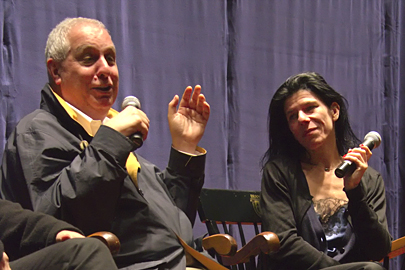Errol Morris and director Vanessa Lapa talk 'The Decent One' after screening
Film examines Nazi leader Heinrich Himmler through correspondence between him and his family
 Photo/Paula McCallum
Photo/Paula McCallumErrol Morris and Vanessa Lapa, director of "The Decent One" talk about the film after a screening Nov. 6.
In front of an audience in the Wasserman Cinematheque at Brandeis, Oscar-winning documentary maker Errol Morris expounded his appreciation for "The Decent One," Vanessa Lapa's film on Nazi leader Heinrich Himmler.
"It's very easy to make a film about how bad a man Heinrich Himmler was, I don't think that's really all that controversial, he's one of the worst human beings in history. What is really interesting is to make a movie that isn't from the outside in, but reverse," Morris said. "What fascinates me is how does he -- or any monster in history -- how do they see themselves? This movie in many ways perfectly captures that and is immensely important for that reason alone."
Morris and Lapa spoke about the film following a screening at Brandeis Nov. 6. The film has been shown at more than a dozen film festivals this year, including Telluride Film Festival and the Jerusalem Film Festival. The screening at Brandeis was sponsored by the Edie and Lew Wasserman Fund, the Film, Television and Interactive Media Program and the Department of History.
"The Decent One" is narrated by recently discovered letters between Himmler, his family and his mistress, read in German by actors and translated into English subtitles. The letters chronicle Himmler's life, from his childhood to his death in 1945.
Lapa had initially planned to use footage from newsreels in the film, but realized the reels were propaganda and didn't fit the messages from the letters. So, with a team of German researchers, Lapa began to search through homemade films by families in a similar a socio-economic position as Himmler, and who went to the same places as Himmler and his family.
"We started to discover this whole world that reflected the inside of Heinrich Himmler," Lapa said. "It took four years."
Morris said the film showed what is sometimes found -- and not found -- in evil.
"The banality of evil is not about the presence of something, it's about the absence of something, something you expected to be there, that just wasn't," Morris said. "To me, it's always meant that when you're confronted with some kind of unbelievable evil, you think that somewhere in the personality there has to be something that accounts for it, (something) that has to be as big as the evil that created it, and sometimes it is not there. That is a really, really frightening and disturbing thought."
Categories: Arts, Humanities and Social Sciences





